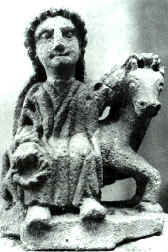Related Research Articles

In Celtic polytheism, Sirona was a goddess worshipped predominantly in East Central Gaul and along the Danubian limes. A healing deity, she was associated with healing springs; her attributes were snakes and eggs. She was sometimes depicted with Apollo Grannus or Apollo Borvo. She was particularly worshipped by the Treveri in the Moselle Valley.

In Celtic mythology, Nantosuelta is the goddess of nature, the earth, fire and fertility.
Old French was the language spoken in most of the northern half of France from approximately the 8th to the 14th centuries. Rather than a unified language, Old French was a linkage of Romance dialects, mutually intelligible yet diverse, spoken in the northern half of France. These dialects came to be collectively known as the langue d'oïl, contrasting with the langue d'oc in the south of France. The mid-14th century witnessed the emergence of Middle French, the language of the French Renaissance in the Île de France region; this dialect was a predecessor to Modern French. Other dialects of Old French evolved themselves into modern forms, each with its own linguistic features and history.
In Gallo-Roman religion, Buxenus was an epithet of the Gaulish Mars, known from a single inscription found in Velleron in the Vaucluse.

Lepontic is an ancient Alpine Celtic language that was spoken in parts of Rhaetia and Cisalpine Gaul between 550 and 100 BC. Lepontic is attested in inscriptions found in an area centered on Lugano, Switzerland, and including the Lake Como and Lake Maggiore areas of Italy.

The French people are an ethnic group and nation primarily located in Western Europe that share a common French culture, history, and language, identified with the country of France.
Niçard, nissart/Niçart, niçois, or nizzardo is the dialect that was historically spoken in the city of Nice, in France, and in all the area of the historical County of Nice. The affiliation of Niçard is debated: it is generally considered a subdialect of Provençal, itself a dialect of Occitan, while some scholars argue that the historical dialect spoken in Nice was more strictly Ligurian.

The Coligny calendar is a second century Celtic calendar found in 1897 in Coligny, France. It is a lunisolar calendar with a five-year cycle of 62 months. It has been used to reconstruct the ancient Celtic calendar. The letters on the calendar are Latin and the language is Gaulish.

Gallo-Roman religion is a fusion of the traditional religious practices of the Gauls, who were originally Celtic speakers, and the Roman and Hellenistic religions introduced to the region under Roman Imperial rule. It was the result of selective acculturation.
Romanization or Latinization, in the historical and cultural meanings of both terms, indicate different historical processes, such as acculturation, integration and assimilation of newly incorporated and peripheral populations by the Roman Republic and the later Roman Empire. The term was used in Ancient Roman historiography and Italian historiography until the fascist period, when the various processes were called the "civilizing of barbarians".

Cissonius was an ancient Gaulish/Celtic god. After Visucius, Cissonius was the most common name of the Gaulish/Celtic Mercury; around seventeen inscriptions dedicated to him extend from France and Southern Germany into Switzerland.
Icovellauna was a Celtic goddess worshiped in Gaul. Her places of worship included an octagonal temple at Le Sablon in Metz, originally built over a spring, from which five inscriptions dedicated to her have been recovered, and Trier, where Icovellauna was honored in an inscription in the Altbachtal temple complex. Both of these places lie in the valley of the river Moselle of eastern Gaul in what are now Lorraine in France and Rhineland-Palatinate in Germany. One such inscription was, somewhat unusually, inscribed on a copper tablet in Roman cursive letters.

Gallo-Roman culture was a consequence of the Romanization of Gauls under the rule of the Roman Empire. It was characterized by the Gaulish adoption or adaptation of Roman culture, language, morals and way of life in a uniquely Gaulish context. The well-studied meld of cultures in Gaul gives historians a model against which to compare and contrast parallel developments of Romanization in other, less-studied Roman provinces.

The Gauls were a group of Celtic peoples of mainland Europe in the Iron Age and the Roman period. Their homeland was known as Gaul (Gallia). They spoke Gaulish, a continental Celtic language.
Maurice Vaïsse is a French historian specialised in international relations and Defence. He is an Editorial Board member on Journal of Intelligence and Terrorism Studies.
Gaulish was an ancient Celtic language spoken in parts of Continental Europe before and during the period of the Roman Empire. In the narrow sense, Gaulish was the language of the Celts of Gaul. In a wider sense, it also comprises varieties of Celtic that were spoken across much of central Europe ("Noric"), parts of the Balkans, and Anatolia ("Galatian"), which are thought to have been closely related. The more divergent Lepontic of Northern Italy has also sometimes been subsumed under Gaulish.

Anvallus was a Gaulish god, known from several public inscriptions at Augustodunum (Autun). Two Latin inscriptions on altars were dedicated by gutuatres in requital of vows; both such dedications began with the formula Aug(usto) sacr(um). The title gutuater is typically understood to mean 'priest'; the gutuatres have at times been taken to be Romanized continuations of the druids. These altars were both discovered in 1900 on the site of Autun's railway station, along with a Greek-style helmet of thin bronze that would have been left there as a votive offering.
Xavier Delamarre is a French linguist, lexicographer, and diplomat. He is regarded as one of the world's foremost authorities on the Gaulish language.
Étienne Taillemite was a French historian and archivist.
References
- ↑ Amar, Yvan (2015-03-04). "DANSE DES MOTS Dictionnaire français-gaulois". Le Voix du Monde.